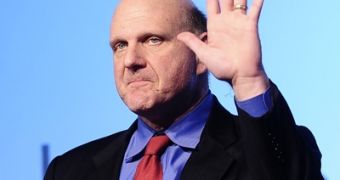Ever since Microsoft officially announced Windows 8, company CEO Steve Ballmer continuously bragged about the new operating system, calling its launch at least as important as Windows 95’s debut.
He said that Windows 8 has the power to “reinvent” the computing world and emphasized that it has all the things a computer user would ever dream of.
It does lack a traditional Start button, but instead it comes with a Start Screen. And this one is a lot more helpful, Ballmer said on several occasions, especially because it allows users to launch apps from a user-friendly dashboard.
It seems, however, that Steve Ballmer has his own personal reason why he tries to promote Windows 8 so much: if Windows 8 fails to impress, he could be out from Microsoft, New York Post writes.
While this is clearly just a rumor and nobody can tell for sure that Ballmer will leave the software giant if Windows 8 proves to be the “reinvented” Vista, we can’t help but wonder who would replace him if he really decided to retire. Maybe it’s time for Gates to come back.
Steven Sinofsky, the one who has always been considered the next Microsoft CEO, has left the company not long ago because of what seemed to be a growing tension between him and Ballmer.
Although this information hasn’t been confirmed, it appears that Sinofsky and Ballmer had different points of view on several products, including here the new Windows 8.
Sinofsky was apparently the one who insisted for a Start Screen in Windows 8 and voices familiar with the matter claim that he even managed to convince Ballmer to dump the Start button.
But the same sources suggest that Sinofsky decided to quit because he had expected to be named the new Microsoft CEO after Windows 8’s launch. This didn’t happen, with Ballmer insisting that he would remain the company CEO until 2017 or 2018.
Now it appears that Ballmer’s future at Microsoft’s helm depends on Windows 8’s sales performance.
The company has recently announced that it had managed to sell up to 40 million Windows 8 copies in just a single month. Nobody knows if this figure actually meets internal sales projections or not, but some insiders claim it doesn’t.
Of course, it’s too early to judge Windows 8, but with so many rumors pointing to a Windows 8 successor coming in mid-2013, the new Microsoft operating system needs to take off as soon as possible. Some think this could happen next year, as the PC industry it relies on is also expected to post a significant recovery.
Windows 8 is currently installed on only 1.49 percent of world’s computers, according to the latest figures released by Net Applications, and even if figures are expected to grow bigger very soon, it’s still not enough for an operating system that was backed up by a $1.5 billion (€1.2 billion) marketing budget.
But as far as Ballmer is concerned, Windows 8 is doing great. So Gates should continue his charity mission and let Ballmer drive Microsoft towards the devices and services concept he wants so much.

 14 DAY TRIAL //
14 DAY TRIAL //